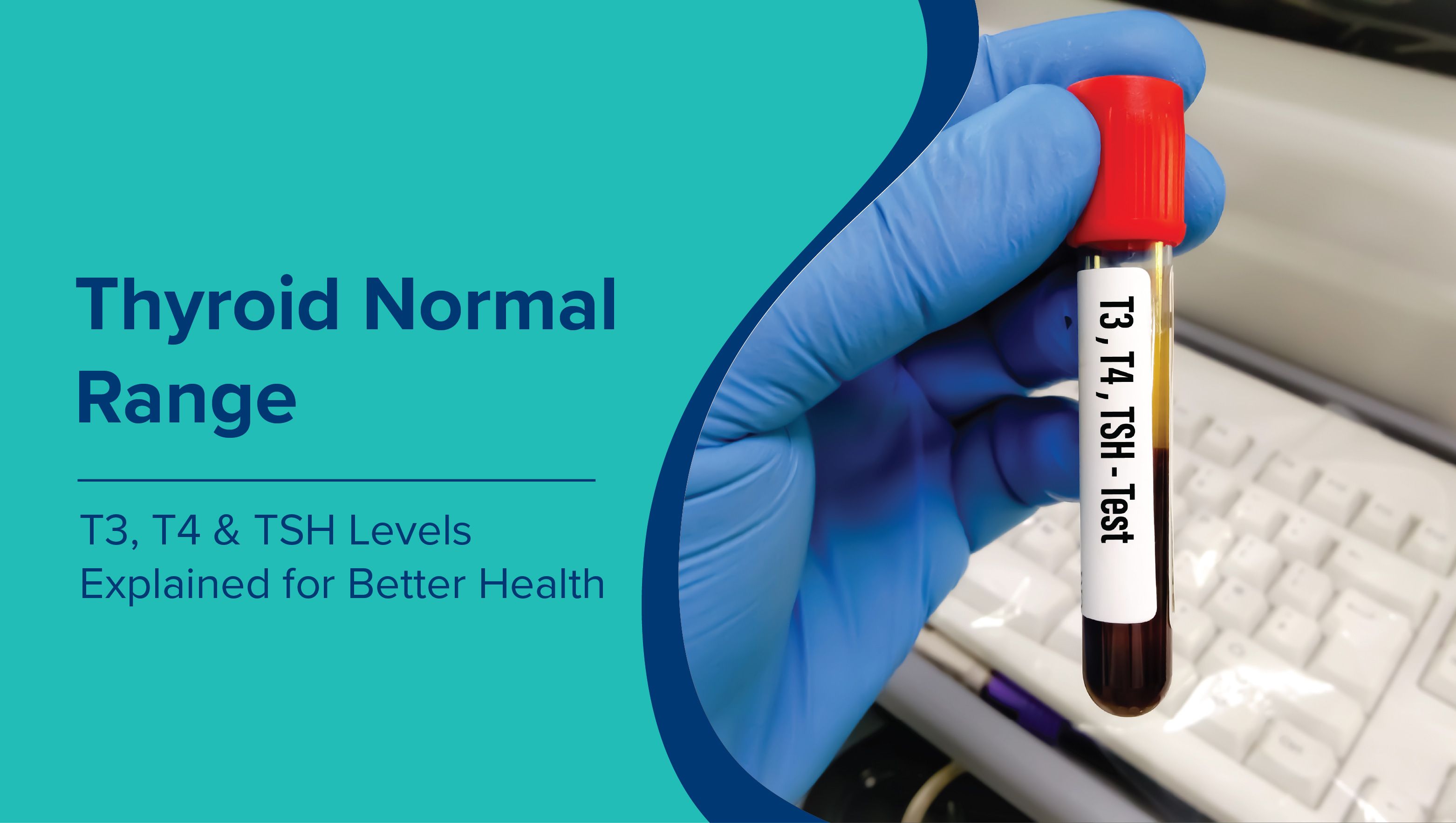The thyroid gland is a small but vital organ that influences metabolism, growth, energy levels, and hormonal balance. Any disturbance in its function can affect multiple systems in the body, often in ways that go unnoticed at first. This is why it is important to know the normal values of thyroid hormones, T3, T4, and TSH. These values serve as benchmarks that help doctors identify whether the thyroid is working as it should, or if an underlying imbalance such as hypothyroidism or hyperthyroidism may be present. However, many people delay thyroid testing because of busy schedules or vague symptoms, often leading to late diagnosis and avoidable complications. The good news is that with MaxAtHome, keeping track of thyroid health becomes much simpler. At-home thyroid profile tests are collected safely by trained professionals, processed in NABL-accredited labs, and results are delivered digitally, ensuring both accuracy and convenience.
Thyroid Function and the Importance of Normal Ranges
The thyroid is a butterfly-shaped gland located at the base of the neck. It produces two vital hormones, triiodothyronine (T3) and thyroxine (T4), that regulate metabolism, body temperature, heart rate, and energy production. Their release is controlled by thyroid-stimulating hormone (TSH), which is secreted by the pituitary gland in the brain.
Keeping these hormones within their normal range is essential for overall health. Even small deviations can disrupt how the body functions. Low hormone levels may cause fatigue, weight gain, dry skin, and sensitivity to cold, while high levels may lead to weight loss, rapid heartbeat, heat intolerance, and restlessness. Measuring thyroid values through routine tests allows early detection of imbalances, helping doctors initiate timely treatment and prevent long-term complications.
Components of a Thyroid Function Test
A Thyroid Function Test (TFT), also called a thyroid profile, is a routine blood test used to assess how well the thyroid gland is working. It usually includes three key hormones, T3, T4, and TSH, each providing unique insights into thyroid function:
-
T3 (Triiodothyronine): The active thyroid hormone that regulates metabolism, body temperature, and energy use. Even small fluctuations in T3 can significantly impact how the body functions.
-
T4 (Thyroxine): The most abundant thyroid hormone, which gets converted into T3 in tissues. Measuring T4 helps determine whether the thyroid gland is producing hormones adequately.
-
TSH (Thyroid Stimulating Hormone): Produced by the pituitary gland, TSH controls the release of T3 and T4. Levels rise when thyroid activity is low and fall when hormone levels are high.
In many cases, doctors may also request Free T3 (FT3), Free T4 (FT4), or thyroid antibody tests for a deeper evaluation.
A TFT is recommended not only to detect conditions such as hypothyroidism and hyperthyroidism but also to monitor patients on thyroid medication and to assess thyroid health during pregnancy. By comparing results against normal reference values, doctors can identify whether thyroid hormones are balanced, slightly off, or significantly abnormal, making TFT one of the most reliable tools for both early detection and long-term monitoring of thyroid disorders.
Thyroid Normal Range: T3, T4, and TSH Levels at a Glance
Thyroid hormones have well-established reference ranges that help in assessing whether the gland is functioning properly. While values may vary slightly depending on the laboratory, the following chart provides a general guideline for adults:
|
Parameter |
Normal Range |
Unit |
|
T3 (Triiodothyronine) |
80 – 200 |
ng/dL |
|
T4 (Thyroxine) |
5.0 – 12.0 |
µg/dL |
|
TSH (Thyroid Stimulating Hormone) |
0.4 – 4.0 |
mIU/L |
Variations by Age and Gender
Thyroid hormone levels are not the same for everyone. They shift slightly with age and life stage:
-
Newborns: Naturally higher TSH levels immediately after birth, which settle within weeks.
-
Children and Adolescents: Slightly higher T4 and TSH ranges to support growth.
-
Adults (Men and Women): Generally fall within the standard reference values, though women may see minor fluctuations due to reproductive hormones.
-
Older Adults: TSH may rise mildly with age, sometimes without indicating disease.
Because of these variations, lab reports often provide age- and gender-specific reference ranges for accurate interpretation.
Thyroid Normal Value in Females
Women are more likely than men to develop thyroid disorders, and their hormone levels can be influenced by menstrual cycles, pregnancy, and menopause. Because of these factors, knowing what counts as “normal” in females is especially important.
-
Reproductive Age: Most women have thyroid values within the standard adult ranges (T3: 80–200 ng/dL, T4: 5–12 µg/dL, TSH: 0.4–4.0 mIU/L).
-
Pregnancy: Thyroid hormone needs increase during pregnancy. TSH levels are generally lower in the first trimester due to hormonal changes, with trimester-specific ranges recommended by doctors.
-
Menopause and Beyond: Hormonal shifts can influence thyroid function, sometimes mimicking symptoms of thyroid imbalance such as fatigue, mood changes, or weight fluctuations.
Regular monitoring is advised for women planning pregnancy, already pregnant, or experiencing symptoms that may overlap with hormonal changes. Early testing helps protect both maternal and reproductive health.
Is Fasting Required for T3, T4, and TSH Test?
One of the most common questions before a thyroid profile test is whether fasting is necessary. In most cases, fasting is not required for T3, T4, and TSH testing, as a normal diet does not significantly affect thyroid hormone levels. However, there are a few important considerations:
-
Timing of the test: Thyroid hormones, especially TSH, can vary slightly during the day. Blood samples are usually taken in the morning for consistency.
-
Medications: Thyroid medications or supplements like biotin may interfere with results. Doctors may advise pausing certain medicines before the test.
-
Special cases: In rare situations, a doctor may recommend fasting if additional tests are ordered alongside the thyroid profile.
How to Interpret Your Thyroid Test Results Accurately
A thyroid profile report usually lists values for T3, T4, and TSH. Understanding how these numbers work together is key to identifying thyroid function:
-
High TSH + Low T4: Indicates hypothyroidism (underactive thyroid).
-
Low TSH + High T4/T3: Suggests hyperthyroidism (overactive thyroid).
-
Normal TSH + Abnormal T3/T4: May indicate non-thyroidal illness or effects of certain medications.
-
High TSH + Normal T3/T4: Often points to subclinical hypothyroidism.
-
Low TSH + Normal T3/T4: May suggest subclinical hyperthyroidism.
Since many factors such as age, pregnancy, or ongoing medication can influence results, only a qualified doctor can provide a complete interpretation. The lab values act as a guide, but clinical symptoms and medical history are equally important in diagnosis.
Common Causes of Abnormal Thyroid Levels
Several factors can lead to thyroid values moving outside the normal range. Some causes are temporary, while others require long-term management:
-
Autoimmune disorders such as Hashimoto’s thyroiditis (causing hypothyroidism) or Graves’ disease (causing hyperthyroidism).
-
Iodine deficiency or excess, which directly affects thyroid hormone production.
-
Medications, including lithium, amiodarone, and certain steroids, which can interfere with thyroid function.
-
Pregnancy-related changes, where hormone fluctuations can temporarily alter results.
-
Thyroid surgery or radiation therapy, which may reduce hormone production.
-
Pituitary gland disorders, which affect TSH production and indirectly impact thyroid activity.
Symptoms of Abnormal T3, T4, and TSH Levels
Thyroid imbalances often develop gradually, and their symptoms can mimic other health issues. Recognising them early is important for timely treatment:
-
Hypothyroidism (Low T3/T4, High TSH): Fatigue, weight gain, dry skin, hair loss, constipation, cold intolerance, slow heart rate, and mood changes.
-
Hyperthyroidism (High T3/T4, Low TSH): Unexplained weight loss, increased appetite, anxiety, palpitations, sweating, heat intolerance, and tremors.
-
General signs of thyroid dysfunction: Irregular periods in women, difficulty concentrating, sleep disturbances, and changes in skin or hair texture.
Because these symptoms overlap with many other conditions, blood tests are the most reliable way to confirm whether thyroid hormones are outside their normal values.
Factors That Affect Normal Thyroid Levels
Thyroid hormone values can fluctuate due to several everyday influences, even in people without diagnosed thyroid disease. These factors may cause temporary changes in test results:
-
Time of day: TSH levels are usually higher in the early morning and lower later in the day.
-
Stress and sleep quality: Chronic stress or poor sleep can disrupt the brain–thyroid connection, leading to altered hormone levels.
-
Dietary factors: Iodine intake, selenium, and zinc play an important role in thyroid function. Both deficiency and excess may affect results.
-
Medications: Certain drugs such as steroids, dopamine, and lithium can interfere with thyroid hormone production or conversion.
-
Illness or infection: Acute illnesses may cause short-term thyroid fluctuations (known as non-thyroidal illness syndrome).
-
Ageing: Older adults may naturally show higher TSH values without any clear disease symptoms.
Understanding these factors helps explain why results can vary from one test to another, and why doctors often look at both hormone levels and clinical symptoms before confirming a diagnosis.
How to Maintain Healthy Thyroid Hormone Levels
While some thyroid disorders require medical treatment, healthy daily practices play an important role in supporting thyroid balance and making test results more reliable.
-
Eat a balanced diet: Include iodine-rich foods such as iodised salt, dairy, and seafood in moderation. Nuts, legumes, and whole grains provide selenium and zinc, which also support thyroid hormone production.
-
Take medicines correctly: If prescribed, thyroid medication should be taken regularly, often on an empty stomach in the morning. Skipping doses or irregular intake can affect hormone levels.
-
Manage stress: Chronic stress can disrupt the brain–thyroid connection. Yoga, meditation, or regular exercise can help maintain balance.
-
Get enough sleep: Consistent, good-quality sleep is essential for regulating hormones and energy levels.
-
Test consistently at the same lab: Reference ranges may vary slightly across labs, so repeat tests at the same place for better accuracy.
-
Avoid self-medication: Overuse of supplements or changes in prescribed medicine without guidance can worsen thyroid function. Always follow medical advice.
-
Schedule regular check-ups: Routine blood tests help track changes early, even before noticeable symptoms appear.
When to See a Doctor
Not all fluctuations in thyroid values indicate disease, but some situations require prompt medical attention. Consulting a doctor is important when:
-
Test results are consistently outside the normal range, especially if symptoms are present.
-
TSH, T3, or T4 values change significantly between repeat tests.
-
Pregnancy is planned or ongoing, as thyroid health is critical for both mother and baby.
-
Persistent symptoms appear, such as unexplained fatigue, weight changes, irregular heartbeat, or mood disturbances.
-
Family history of thyroid disease is present, increasing the risk of developing similar conditions.
Why Choose MaxAtHome for Thyroid Testing
Managing thyroid health requires reliable testing, and MaxAtHome makes the process simple and stress-free. By combining medical accuracy with home convenience, it ensures patients get the care they need without visiting a lab or hospital.
-
Home sample collection by trained professionals for safety and comfort
-
NABL-accredited laboratories for precise and trustworthy results
-
Expert-verified reports reviewed by specialists for accuracy
-
Digital delivery of results, accessible anytime for follow-up consultations
-
Trusted service, with millions of patients already benefiting from MaxAtHome diagnostics
With these advantages, keeping track of thyroid hormone levels becomes easier, faster, and more reliable. To book a thyroid test at home, call 9240299624 or schedule the test online through our easy-to-use booking platform.
Frequently Asked Questions (FAQs)
Q: How do I know if my thyroid medication dose is correct?
The correct dose is confirmed when symptoms improve and blood test values (T3, T4, TSH) stay within the normal range. Doctors usually recheck levels every few weeks or months to adjust the dosage if needed.
Q: What is a normal thyroid level for a woman?
In adult women, normal values are T3: 80–200 ng/dL, T4: 5–12 µg/dL, and TSH: 0.4–4.0 mIU/L. During pregnancy, trimester-specific ranges apply.
Q: What is a normal thyroid level by age?
Children and newborns have higher TSH values, while adults fall within standard ranges. Older adults may show slightly higher TSH without disease.
Q: Can thyroid levels be normal with hypothyroidism?
Yes. In subclinical hypothyroidism, T3 and T4 may remain normal while TSH is slightly elevated.
Q: What happens when thyroid numbers are low?
Low T3 and T4 with high TSH indicate hypothyroidism. Symptoms may include fatigue, weight gain, cold intolerance, and mood changes.
Q: Will a blood test show hypothyroidism?
Yes, a thyroid profile test (T3, T4, TSH) can detect hypothyroidism. Sometimes only TSH is abnormal in early stages.
Q: How can I read a thyroid report?
- High TSH + Low T4 = Hypothyroidism
- Low TSH + High T3/T4 = Hyperthyroidism
- Abnormal T3/T4 with normal TSH = May need further evaluation
Always confirm with a doctor for accurate interpretation.
Q: Does the normal range for thyroid hormones change by age or gender?
Yes. Children, older adults, and pregnant women have different reference ranges. Doctors interpret results using age- and condition-specific values.
Q: Is fasting required for a T3, T4, and TSH test?
Fasting is not usually required. Tests are often done in the morning, and certain medicines (like biotin or thyroid drugs) may need to be paused if advised by a doctor.
Q: What causes abnormal thyroid levels?
Autoimmune conditions, iodine imbalance, certain medications, pregnancy changes, or pituitary gland disorders are common causes.
Q: What factors affect thyroid levels?
Stress, diet, time of day, illness, ageing, and medications can all influence thyroid values.
Q: Where can I book a thyroid test near me?
With MaxAtHome, thyroid profile tests are available across major Indian cities. Home sample collection, NABL-accredited lab reports, and digital results make it easy to monitor thyroid health from home.
Q: How much does a thyroid test cost near me?
The cost of thyroid testing may vary depending on the city, whether it is a single TSH test or a complete thyroid profile, and if additional tests are included. At MaxAtHome, pricing for every test at home is kept transparent and affordable with no hidden charges. To book a thyroid test at home, call 9240299624 or schedule it online through our easy-to-use booking platform.















